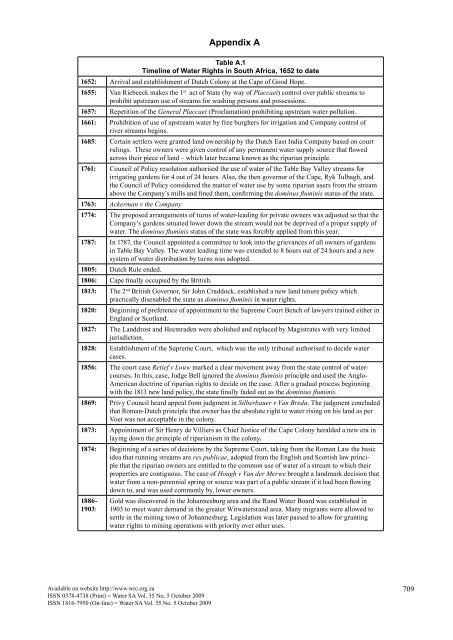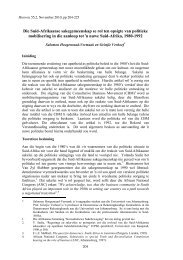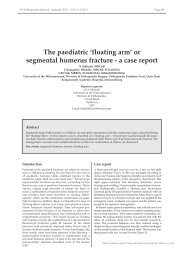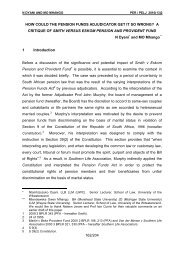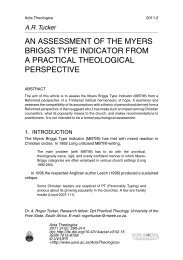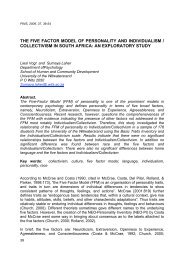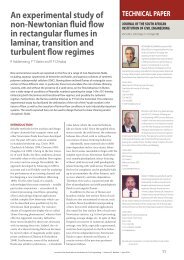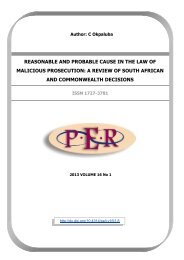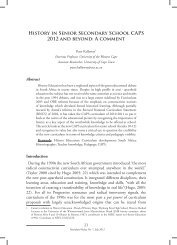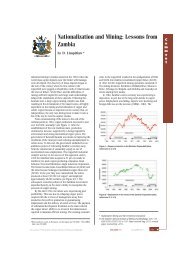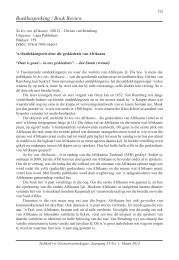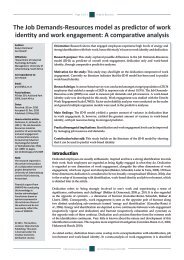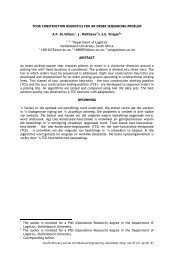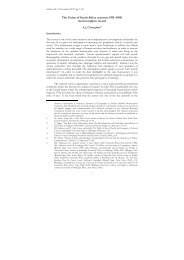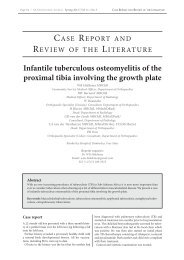A detailed analysis of evolution of water rights in South Africa: An ...
A detailed analysis of evolution of water rights in South Africa: An ...
A detailed analysis of evolution of water rights in South Africa: An ...
Create successful ePaper yourself
Turn your PDF publications into a flip-book with our unique Google optimized e-Paper software.
Appendix A<br />
Table A.1<br />
Timel<strong>in</strong>e <strong>of</strong> Water Rights <strong>in</strong> <strong>South</strong> <strong>Africa</strong>, 1652 to date<br />
1652: Arrival and establishment <strong>of</strong> Dutch Colony at the Cape <strong>of</strong> Good Hope.<br />
1655: Van Riebeeck makes the 1 st act <strong>of</strong> State (by way <strong>of</strong> Placcaet) control over public streams to<br />
prohibit upstream use <strong>of</strong> streams for wash<strong>in</strong>g persons and possessions.<br />
1657: Repetition <strong>of</strong> the General Placcaet (Proclamation) prohibit<strong>in</strong>g upstream <strong>water</strong> pollution.<br />
1661: Prohibition <strong>of</strong> use <strong>of</strong> upstream <strong>water</strong> by free burghers for irrigation and Company control <strong>of</strong><br />
river streams beg<strong>in</strong>s.<br />
1685: Certa<strong>in</strong> settlers were granted land ownership by the Dutch East India Company based on court<br />
rul<strong>in</strong>gs. These owners were given control <strong>of</strong> any permanent <strong>water</strong> supply source that flowed<br />
across their piece <strong>of</strong> land – which later became known as the riparian pr<strong>in</strong>ciple.<br />
1761: Council <strong>of</strong> Policy resolution authorised the use <strong>of</strong> <strong>water</strong> <strong>of</strong> the Table Bay Valley streams for<br />
irrigat<strong>in</strong>g gardens for 4 out <strong>of</strong> 24 hours. Also, the then governor <strong>of</strong> the Cape, Ryk Tulbagh, and<br />
the Council <strong>of</strong> Policy considered the matter <strong>of</strong> <strong>water</strong> use by some riparian users from the stream<br />
above the Company’s mills and f<strong>in</strong>ed them, confirm<strong>in</strong>g the dom<strong>in</strong>us flum<strong>in</strong>is status <strong>of</strong> the state.<br />
1763: Ackerman v the Company<br />
1774: The proposed arrangements <strong>of</strong> turns <strong>of</strong> <strong>water</strong>-lead<strong>in</strong>g for private owners was adjusted so that the<br />
Company’s gardens situated lower down the stream would not be deprived <strong>of</strong> a proper supply <strong>of</strong><br />
<strong>water</strong>. The dom<strong>in</strong>us flum<strong>in</strong>is status <strong>of</strong> the state was forcibly applied from this year.<br />
1787: In 1787, the Council appo<strong>in</strong>ted a committee to look <strong>in</strong>to the grievances <strong>of</strong> all owners <strong>of</strong> gardens<br />
<strong>in</strong> Table Bay Valley. The <strong>water</strong> lead<strong>in</strong>g time was extended to 8 hours out <strong>of</strong> 24 hours and a new<br />
system <strong>of</strong> <strong>water</strong> distribution by turns was adopted.<br />
1805: Dutch Rule ended.<br />
1806: Cape f<strong>in</strong>ally occupied by the British.<br />
1813: The 2 nd British Governor, Sir John Craddock, established a new land tenure policy which<br />
practically disenabled the state as dom<strong>in</strong>us flum<strong>in</strong>is <strong>in</strong> <strong>water</strong> <strong>rights</strong>.<br />
1820: Beg<strong>in</strong>n<strong>in</strong>g <strong>of</strong> preference <strong>of</strong> appo<strong>in</strong>tment to the Supreme Court Bench <strong>of</strong> lawyers tra<strong>in</strong>ed either <strong>in</strong><br />
England or Scotland.<br />
1827: The Landdrost and Heemraden were abolished and replaced by Magistrates with very limited<br />
jurisdiction.<br />
1828: Establishment <strong>of</strong> the Supreme Court, which was the only tribunal authorised to decide <strong>water</strong><br />
cases.<br />
1856: The court case Retief v Louw marked a clear movement away from the state control <strong>of</strong> <strong>water</strong>courses.<br />
In this, case, Judge Bell ignored the dom<strong>in</strong>us flum<strong>in</strong>is pr<strong>in</strong>ciple and used the <strong>An</strong>glo-<br />
American doctr<strong>in</strong>e <strong>of</strong> riparian <strong>rights</strong> to decide on the case. After a gradual process beg<strong>in</strong>n<strong>in</strong>g<br />
with the 1813 new land policy, the state f<strong>in</strong>ally faded out as the dom<strong>in</strong>ius flum<strong>in</strong>is.<br />
1869: Privy Council heard appeal from judgment <strong>in</strong> Silberbauer v Van Breda. The judgment concluded<br />
that Roman-Dutch pr<strong>in</strong>ciple that owner has the absolute right to <strong>water</strong> ris<strong>in</strong>g on his land as per<br />
Voet was not acceptable <strong>in</strong> the colony.<br />
1873: Appo<strong>in</strong>tment <strong>of</strong> Sir Henry de Villiers as Chief Justice <strong>of</strong> the Cape Colony heralded a new era <strong>in</strong><br />
lay<strong>in</strong>g down the pr<strong>in</strong>ciple <strong>of</strong> riparianism <strong>in</strong> the colony.<br />
1874: Beg<strong>in</strong>n<strong>in</strong>g <strong>of</strong> a series <strong>of</strong> decisions by the Supreme Court, tak<strong>in</strong>g from the Roman Law the basic<br />
idea that runn<strong>in</strong>g streams are res publicae, adopted from the English and Scottish law pr<strong>in</strong>ciple<br />
that the riparian owners are entitled to the common use <strong>of</strong> <strong>water</strong> <strong>of</strong> a stream to which their<br />
properties are contiguous. The case <strong>of</strong> Hough v Van der Merwe brought a landmark decision that<br />
<strong>water</strong> from a non-perennial spr<strong>in</strong>g or source was part <strong>of</strong> a public stream if it had been flow<strong>in</strong>g<br />
down to, and was used commonly by, lower owners.<br />
1886-<br />
1903:<br />
Gold was discovered <strong>in</strong> the Johannesburg area and the Rand Water Board was established <strong>in</strong><br />
1903 to meet <strong>water</strong> demand <strong>in</strong> the greater Wit<strong>water</strong>srand area. Many migrants were allowed to<br />
settle <strong>in</strong> the m<strong>in</strong><strong>in</strong>g town <strong>of</strong> Johannesburg. Legislation was later passed to allow for grant<strong>in</strong>g<br />
<strong>water</strong> <strong>rights</strong> to m<strong>in</strong><strong>in</strong>g operations with priority over other uses.<br />
Available on website http://www.wrc.org.za<br />
ISSN 0378-4738 (Pr<strong>in</strong>t) = Water SA Vol. 35 No. 5 October 2009<br />
ISSN 1816-7950 (On-l<strong>in</strong>e) = Water SA Vol. 35 No. 5 October 2009<br />
709


